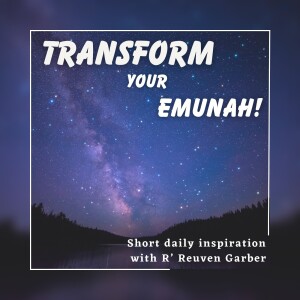
Tuesday Dec 03, 2024
201 - Supreme Service
We've been discussing the tremendous opportunity we have to communicate with Hashem in both the form of our personal prayers, every single one of us in our own way, with our own words, at our own time, in our own place, as well as the tremendous opportunity we have to recite the prescribed prayers which were authored by the great sages of times of old through divine inspiration, and how each letter is imbued with tremendous holiness beyond anything we could imagine. In both of these forms of communication with Hashem, our job is to build our emunah - our belief.
When I talk to Hashem in my own words, He is really listening to every word. And as we pointed out from the Torah sources, the Sefer Chareidim and the Shelah cite the masters of Kabbalah, that when I speak to Hashem in my own words, the potency of that has seven times more effect than even that of Torah learning, and we know the great value of Torah learning, where the Mishnah teaches us that the value of Torah learning equals all of the mitzvos put together, yet, talking to Hashem has more of an effect on the neshama than even that; and at the same time to build our emunah, that when we recite the prescribed blessings throughout the day, to have more intention and meaning, and perhaps recite them slower, to be able to truly focus on what we are saying, and not miss out on the opportunity of tapping into the tremendous power of these prescribed words by the holy sages.
We spoke about how in the times of the future, although all of the animal offerings will cease to exist, nevertheless, we are taught that the korban toda - the animal offering of thanks, will always exist, because the prayer of thanks is something so important and fundamental to us, that although we will climb to such spiritual heights in the future not needing the other forms of animal offerings, nevertheless, we will always need the animal offerings of thanks. And in the same vein, we are taught by Torah sources that all songs will cease to exist in the future, because again, we will be beyond what songs can achieve for us, but the one song that will remain is mizmor lesodah, is the song of thanking Hashem, because when we thank Hashem, that is ultimately the highest expression of our emunah, because if we truly believe that Hashem would only do what is best for us, then ultimately we'll just sing to Him and thank Him and praise Him for everything He does for us all day long.
Although ideally we are called on to make every effort to say all of the prescribed prayers and blessings with the best intention and meaning that we can, and as we spoke about when it comes to the verses of psukei dezimra, which were initially designed to be songs for Hashem, the ideal course would be to say all of those prayers in form of song, praising and thanking Hashem, however, in particular, when it comes to the paragraph of mizmor lesodah, the Shulchan Aruch in section 51 outlines that we are called on to sing the chapter of mizmor lesodah, which is the song of gratitude, because again, expressing our gratitude to Hashem is such a fundamental principle.
There is a fascinating observation of the Maharsha to the Gemara in Brachos 32b, where the Gemara states that since the time of the destruction of the Beis Hamikdash, prayers are not as readily received by Hashem. However, there seems to be an apparent contradiction from the Gemara elsewhere, where the Gemara in Pesachim 85b states that even were there to be an iron wall separating us from Hashem, our prayers would always make their way up to Hashem. And the Maharsha resolves the contradiction as follows. He says that the first Gemara refers to when we make requests from Hashem. When doing so, yes, sometimes we need to pray again and again and again until our prayer will make the desired effect. Whereas the second Gemara we spoke about, says the Maharsha, is referring to prayers of praise and gratitude.
What a tremendous privilege we have to reach out to Hashem about anything and everything, in all forms of prayer, both the prescribed prayers as well as our personal prayers, both in terms of requesting from Hashem as well as prayers of praise and gratitude. Let us capitalize on the opportunity to pray to Hashem in all areas, and perhaps in particular, to make prayers of praise and gratitude to Hashem, which is the highest type of prayer that can exist.
No comments yet. Be the first to say something!